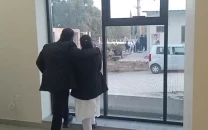Human security: ‘Pressure state to be more responsive’
Emphasise the need for counter-radicalisation narratives.

The meeting’s objective was to discuss the state of human security in Pakistan. PHOTO: ANAM HALEEM
Experts have urged the need for raising public awareness to pressure the state to care for its citizens to improve overall human security.
The suggestions were floated at a meeting on human security, organised by the Sustainable Development Policy Institute (SDPI) at a local hotel on Wednesday.
The meeting’s objective was to discuss the state of human security in Pakistan, given the importance of the human security paradigm in the post-2015 United Nations (UN) development agenda.
The meeting aimed at creating awareness about human security and gathering expert opinion on research needs for the topic, said SDPI’s head on gender and human security section Dr Maleeha Aslam.
The meeting was attended by government officials, representatives of UN agencies, human rights bodies, lawyers, academics, researchers and journalists.
According to the United Nations Development Programme, human security is a concept that includes economic security, food security, health security, environmental security, personal security, community security and political security.
The concept, therefore, goes beyond security in the pure military sense of the term to a broader socio-economic understanding of protection and prosperity of the individual.
The experts suggested possible preventive measures to counter radicalisation in the country as well as educating people about state laws, constitutional rights and international human rights.
The meeting also emphasised that state institutions should be sensitised to provide constitutional rights to ethnic groups, minorities, labourer and workers.
During a session on deradicalisation in Pakistan, some participants said it was the education system more than the lack of education that might have contributed to extremist and intolerant views in society.
Other participants said that the state was responsible for allowing, and in a sense, promoting the narrative of radicalisation, including propaganda in the curriculum, to spread in the country.
The participants also criticised the state’s colonial nature and the privilege it accords to a minority which was already in power while ignoring the fundamental rights of the majority.
They stressed the need for counter-radicalisation narratives. Accountability of the state for failing to protect its citizens was also highlighted.
Published in The Express Tribune, May 8th, 2014.



















COMMENTS
Comments are moderated and generally will be posted if they are on-topic and not abusive.
For more information, please see our Comments FAQ